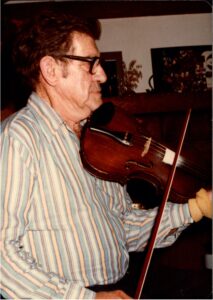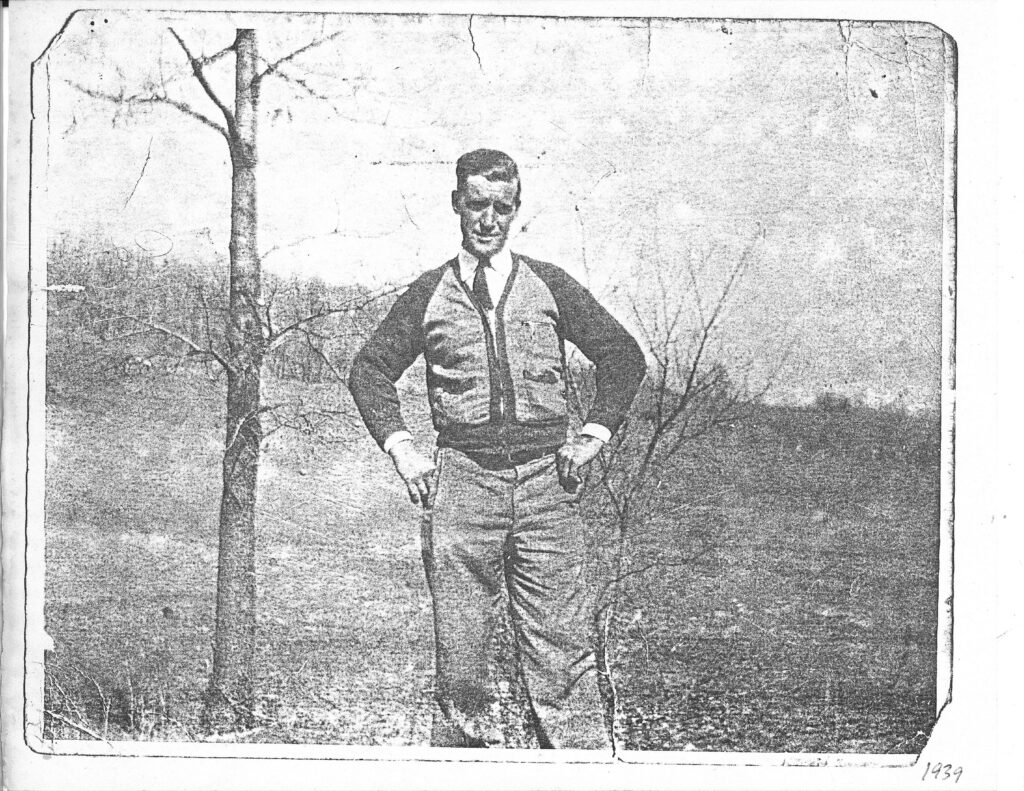Robert Lee “Strawberry” McCloud – Bloomington Breakdown – FRC749
‘He lived hard, he worked hard, he played hard’
by Steve Hinnefeld
One day in February 1975, Randy Marmouzé stopped by the trailer where I lived in Bloomington, Indiana, toting his banjo. “Let’s go see if Strawberry wants to play some tunes,” he said.
Randy and I had been playing old-time music together for several years, sometimes at local dances and parties. I’d heard of Strawberry McCloud, a semi-legendary local fiddler who was rumored to have played with Clayton McMichen, but I’d never met him. I think I was a little intimidated.
I’d also heard his wife had passed away, and he’d been through a difficult time. I didn’t know what to expect. Would he want to play music with a couple of young folks who showed up unannounced?
But I grabbed my guitar and we drove to where he was living with his daughter and son-in-law, Judy and Phil Taylor. Randy knocked on the door and asked for Strawberry, and Judy went to get him. I thought he seemed a bit disoriented when he came to the door; maybe he’d been napping. But he invited us in, led us to the furnished basement, got out his fiddle, and began to play.
I recall that his playing initially seemed a bit shaky, apparently after a spell of not having the fiddle out of the case, but he warmed up quickly. He played familiar tunes like Soldier’s Joy, Arkansas Traveler and Black-Eyed Susie, but his versions were idiosyncratically his own. He played in a lively, assertive style that left no doubt that he knew just what he wanted the music to sound like.
Randy had played with him previously, in jam sessions at a bait shop and a country store near Smithville, just south of Bloomington and close to where Strawberry lived. But, for the most part, my friends and I, mostly in our 20s, had been learning music from records by revivalist groups like the Fuzzy Mountain and Highwoods string bands and from reissues of old 78s. Strawberry introduced us to music that was fresh, authentic and genuinely “old-time,” not the warmed-over bluegrass we’d sometimes hear from older local musicians.
Before long we were playing together frequently, often with other young musicians joining in. Strawberry moved into a small house across the street from Judy and Phil, and that became the site for music gatherings. We also played at Randy’s rented house on Shields Ridge Road south of Bloomington.
Strawberry would fix strong cups of instant coffee and we would sit in his front room and play. Aspiring old-time musicians like Mark Feddersen, Donna Doughten, Bob Herring and others, would join in. Strawberry’s son-in-law, John Neff, would occasionally stop by and play the old upright piano in the front room. Guitar player Jeff Claus and fiddler Judy Hyman, dedicated and accomplished musicians and students of old-time music, moved to Bloomington in 1976 to study at Indiana University, and Jeff became a regular guitarist with the informal groups.

The house in Bloomington where Strawberry lived with Ren Oschin and where he often hosted music sessions from 1975 to 80.
Soon Strawberry was playing for new audiences, often at the weekly Bloomington Old-Time Music and Dance Group dances. His irregular tunes and timing sometimes gave the contra callers fits, but Bloomington dancers loved the drive and exuberance of his playing. “He was so much fun to dance to,” recalled longtime dancer Martha Steel Marmouzé , who married Randy Marmouzé in 1977. “The music was sassy. We would sway our hips and drag our feet.”
The more Strawberry played, the more tunes he would unearth from memory. His repertoire included not just hoedowns but waltzes, blues numbers, and pop tunes including Tin Pan Alley and country standards. As Teri Klassen explains in the essay on his tunes and influences, he had lost the use of the little finger on his left hand in a construction accident, but he compensated with a style that relied on blue notes, slides and syncopation. He radiated confidence when he played.
Bob “Strawberry” McCloud was born Nov. 11, 1907, in Bourbon County, Kentucky, just east of Lexington. When he was a child, his family moved a few miles to Clark County, near the small city of Winchester. He recalled that he started playing the fiddle at age 8, learning from his two older brothers — he also had three sisters — and from musicians from the region, eventually including Doc Roberts. This was pre-rural electrification, and the family didn’t have a radio or phonograph, so learning took place in person.
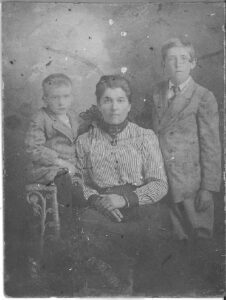
Strawberry as a young child with his mother and his older brother Jack. Photo courtesy Junior McCloud.
The self-described “black sheep” of the family, he married young. The 1930 census shows him, age 22, living in Clark County with his wife, Irene, her parents, and their 3-year-old daughter, Dorothy. The marriage didn’t last, however, possibly because music, travel and the musician’s lifestyle got in the way.
In his later years, prompted by an audience, he would talk about playing with Clayton McMichen and the Georgia Wildcats and, sometimes, with Gid Tanner and the Skillet Lickers. We haven’t found documentation of this, and the stories may have been embellished. But the basics seem likely, at least regarding McMichen. Old-time bands of the late ‘20s and early ‘30s were often loose groups of musicians, according to our research. They would pick up sidemen by their availability for contests, radio broadcasts and tours, and it’s not surprising there aren’t records of his playing with the groups.
Also, Strawberry played at such a high level late in life, suggesting he was a professional level musician when he learned and polished his skill as a young man. He enjoyed being the center of attention and gravitated to the microphone if one was available. He never seemed to doubt his fiddling was special.
But music didn’t pay the bills for a growing family. Encouraged by his older brothers, Strawberry became a heavy equipment operator. He was proud of his skill at running a grader and other machinery, but work could be sporadic, and it was dangerous in an era before OSHA imposed safety regulations. Strawberry suffered serious injuries at least twice, once spending months in the hospital.
At age 33, he married 16-year-old Anna Louise Jackson, the daughter of a barber and a piano player in tiny Owensburg, Indiana. They had eight children, one of whom died in infancy, and raised them with considerable help from their extended family. They moved often to follow construction work. One son remembered that he never finished an academic year in the same school where he started it.
Strawberry kept playing music socially, however. His and Anna’s two oldest surviving children – Judy Taylor, born in 1941, and Junior McCloud, born in 1944 – said their parents got together with friends nearly every weekend, with tubs of beer in the back yard. “There might be three guys there playing music, there might be 10 or 12,” Junior said.
Strawberry’s children said the McCloud family life included “good times” but also “bad times.” Regarding her father, Judy Taylor said, “He lived hard, he worked hard, he played hard.”
We’ve heard a couple of stories to explain the nickname “Strawberry.” One version is that he was “as wild as a strawberry roan horse.” In another, he was fiddling at a party while a red-haired woman danced suggestively. He yelled, “Go, Strawberry Roan!,” just as his wife walked up. Friends started using the moniker to needle him, and it stuck.
Anna McCloud died in October 1973 at age 49. Her loss was a serious blow for Strawberry. Mike Johnson, who grew up near Smithville and played guitar with Strawberry as a teenager, remembered that he was sometimes incapacitated by grief and alcohol and played little for the next year or so.
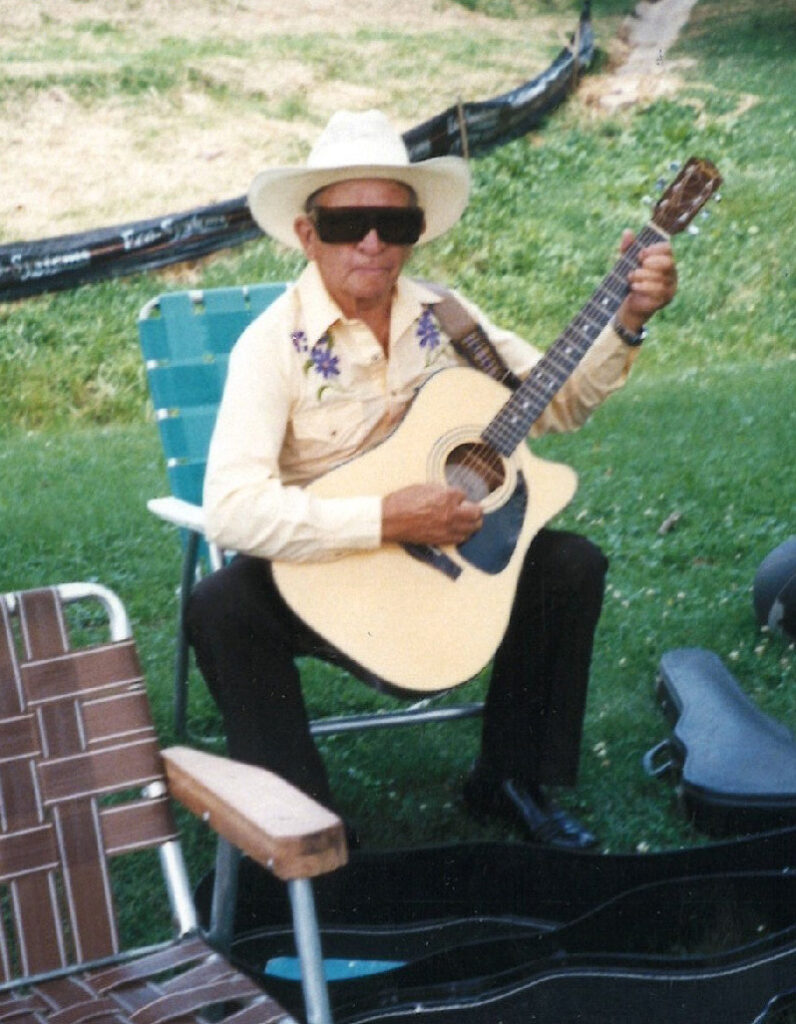
Strawberry’s nephew John Willie Myers playing guitar at an outdoor gathering. Photo courtesy of Junior McCloud.
In time, he seemed to thrive again playing music with young musicians and often for young audiences. His powerful, bluesy fiddling and Randy Marmouzé ’s driving and relentless clawhammer-style banjo playing were an excellent match, and they loved playing with each other. Before long, Strawberry McCloud and Friends (sometimes as the Bloomington Ramblers) were playing gigs around Indiana: the Old Fiddlers Gathering at Battle Ground, a festival at New Harmony, a music and dance demonstration at Conner Prairie living history museum. He and his companion Rene (later Ren) Oschin traveled to music festivals in Ohio and West Virginia, where Strawberry was a featured artist, led workshops and shared his music with a larger audience. He also enjoyed reconnecting and playing with musicians closer to his own age, including his nephew John Willie Myers, who lived in Liberty, Indiana.
A lifelong smoker, a tobacco chewer, and off-and-on heavy drinker, Strawberry developed severe health problems in his 70s. He died Oct. 4, 1980, at age 72.
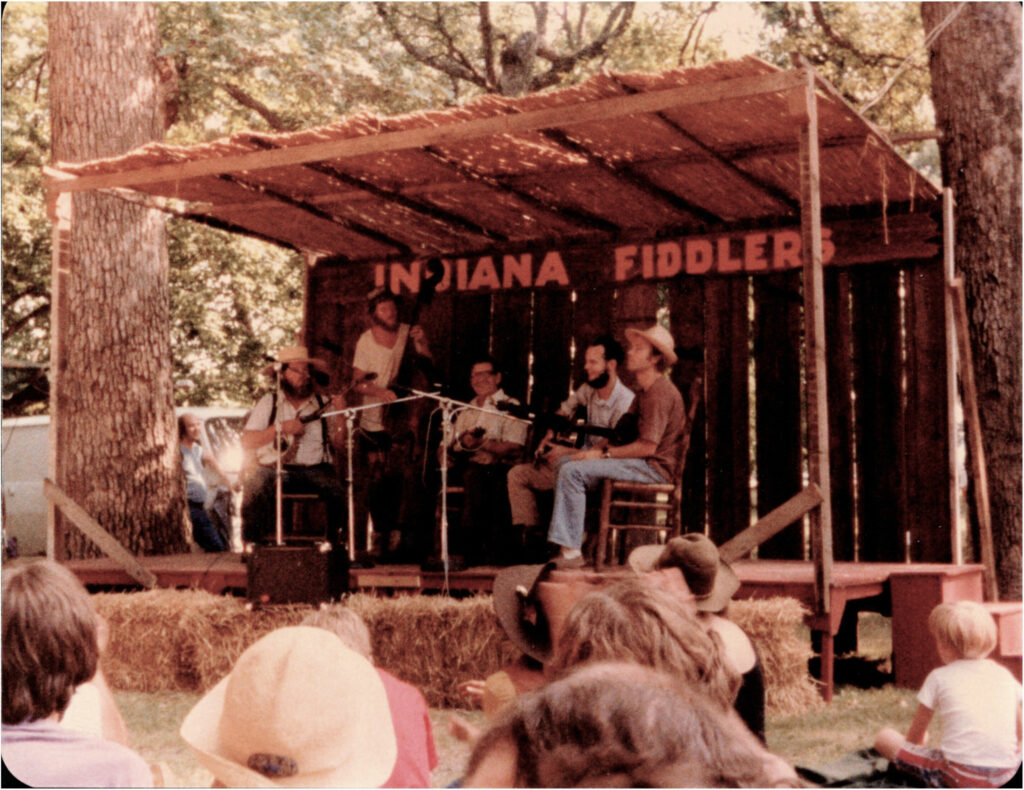
Strawberry McCloud and friends at the Indiana Old Fiddlers’ Gathering, Battle Ground, Indiana, 1977. From left, Randy Marmouzé, Mark Feddersen, Strawberry, Jeff Claus and Steve Hinnefeld. Photo: Martha Marmouzé.
Working on this recording project, Teri Klassen and I have often wished we had asked Strawberry so many questions: about his life, his family, where he learned his tunes and why he played them the way he did. And we’ve wished we had kept better records of the things he did say. We were young, and we were focused on the music and the fun we were having. The questions could wait.
But we are deeply grateful to the friends who had the foresight to make and preserve these field recordings and who shared them for this project, especially Randy Marmouzé (who died in 2016), Ren Oschin (who died in 2022), Ted Hall (who died in 2023), Gary Stanton, Kerry Blech (and the Kent State Folk Festival), Andy Cahan, Jeff Claus, Wayne Erbsen, and Gerry Milnes (and the Augusta Heritage Workshop). We also greatly appreciate Judy Taylor and Junior McCloud for generously sharing memories and photographs of their father and their family.
Listening to these recordings has taken us back and reminded us that Bob “Strawberry” McCloud was an amazing fiddler and a special individual. We were fortunate to know him and to play music with him. We hope – as he would have hoped – that his tunes will liven up your dances and music sessions.

